|
|
|
Sort Order |
|
|
|
Items / Page
|
|
|
|
|
|
|
| Srl | Item |
| 1 |
ID:
087835
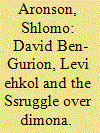

|
|
|
|
|
| Publication |
2009.
|
| Summary/Abstract |
The scholarly discussion of Israel's nuclear programme has reached a
degree of maturity, which allows some basics to become indisputable. As in
any other field of intense political-moral and strategic deliberations, the
role of Israel's nuclear programme, at first its very existence, were matters
of dispute or of different interpretations.1 Thus, this article will start with a
description and analysis of David Ben-Gurion's security policy based upon
his lessons learned from the Holocaust and Israel's War of Independence
combined and the ensuing deviations from it.
|
|
|
|
|
|
|
|
|
|
|
|
|
|
|
|
| 2 |
ID:
167790
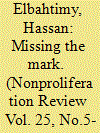

|
|
|
|
|
| Summary/Abstract |
Did nuclear considerations play an important role in the outbreak of the 1967 Arab-Israeli War? This research article seeks to answer this question by examining Egyptian decisions and conduct during the crisis preceding the war. The article argues that, despite long-standing Egyptian concerns over Israeli nuclear ambitions, the issue played only a marginal role in Egypt’s path to war. Egypt’s slide into war was a result of miscalculation rather than a deliberate plan to destroy Dimona. During the pre-war crisis, the nuclear dimension played only a minor role in Egyptian military planning. While a contingency plan to target Dimona was studied, it was never implemented. The article predominantly draws on Arabic-language sources, including first-hand accounts of Egyptian decision making during the pre-war crisis.
|
|
|
|
|
|
|
|
|
|
|
|
|
|
|
|
| 3 |
ID:
167788
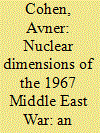

|
|
|
|
|
| Summary/Abstract |
For many years, the nuclear dimensions of the 1967 Middle East War were unacknowledged and obscure. In the last two decades, however, bits and pieces of evidence have surfaced about this issue. This article reviews and assesses the current state of knowledge on these aspects of the pre-war crisis, i.e., what we know with confidence, what we suspect, and what remains unknown. The first section explores the prewar background: the state of Israel’s nuclear project as well as the Israeli perception of Dimona as a possible trigger for war. The second part deals with the two nuclear dimensions of the crisis itself. The first is the role of Dimona in shaping, even precipitating, the Israeli response to the crisis. The second is the crash nuclear-related activity that took place during the crisis. The article reviews recent testimonies on how Israel assembled its first nuclear-explosive device while exploring operational ideas for improvising a “last resort” demonstration.
|
|
|
|
|
|
|
|
|
|
|
|
|
|
|
|
| 4 |
ID:
139394
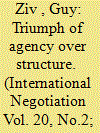

|
|
|
|
|
| Summary/Abstract |
This article advances the proposition that when the negotiator is empowered to reach an agreement on behalf of his or her government, agency has the potential to triumph over structure. The negotiator whose personal attributes include flexibility, sensitivity, inventiveness, tenacity and patience is more likely to meet this potential. Shimon Peres, the director-general of Israel’s Ministry of Defense in the mid-1950s, possessed many of these traits. He was also given virtually free rein by Prime Minister and Defense Minister David Ben-Gurion to pursue negotiations with France over the acquisition of a nuclear reactor. Despite significant structural hurdles – financial difficulties, domestic opposition, u.s. disapproval, and an unstable and divided French Fourth Republic – Peres’s unorthodox diplomacy allowed Israel to become a nuclear power. This case highlights the oft-overlooked role of agency in political science, in general, and in international negotiations, in particular.
|
|
|
|
|
|
|
|
|
|
|
|
|
|
|
|
| 5 |
ID:
151058


|
|
|
|
|
| Summary/Abstract |
This work examines U.S.-Israeli cooperation on nuclear desalination, arguing that neither technical nor financial obstacles were the main reasons for its demise. By late 1968 U.S. policy makers concluded that the offer of a reactor for desalination would not sway Israel from its determination to maintain secrecy at Dimona, leaving open the way to a nuclear military option.
|
|
|
|
|
|
|
|
|
|
|
|
|
|
|
|
| 6 |
ID:
096943
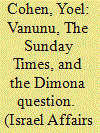

|
|
|
|
|
| Publication |
2010.
|
| Summary/Abstract |
On 5 October 1986 The Sunday Times published an expose about Israel's secret programme at its nuclear reactor in Dimona. Entitled 'Revealed: Israel's Nuclear Secrets', the expose drew upon data received from Mordechai Vanunu who worked at the reactor for seven years as a technician. The newspaper calculated that Israel possessed 100-200 nuclear warheads. The expose also claimed that Israel was developing a thermonuclear and neutron nuclear capability. The expose was a watershed in Israeli public and foreign governmental perceptions about the country's nuclear programme. While the expose resulted in a revision of international estimates about Israel's nuclear capability, some questioned The Sunday Times' estimates. The disclosure failed to bring about the collapse of the country's ambiguity policy. Reflecting the seriousness of the security leak, Vanunu was abducted back to Israel from Europe by the Mossad and sentenced to 18 years' imprisonment on charges of espionage and treason. This article examines how The Sunday Times investigated Vanunu's account, the impact of the expose abroad and inside Israel, and analyses the behaviour of the newspaper after Vanunu's abduction.
|
|
|
|
|
|
|
|
|
|
|
|
|
|
|
|
|
|
|
|
|